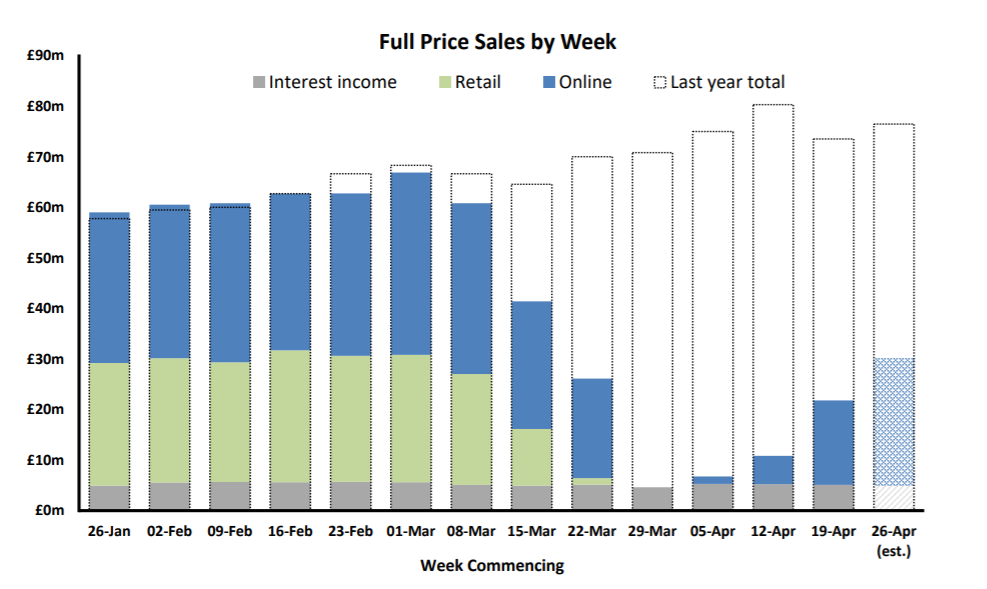Next braces itself for 40% sales drop as it prepares to re-open stores

Enderby-based retail giant Next says it expects sales to be 40% down this year after revenue fell “deeper and faster” than anticipated when it revealed its stress test in March.
Next says it is now expecting lower sales in both the first and second half of the year, but that its finance are “as secure as in March, if not more so” after a series of initiatives including asset sales, suspending share buybacks and dividends and agreeing with its banks to waive financial covenants on its credit facilities for the coming year.
Next says it is now relying heavily on its online operations and the time of store re-openings and is planning for a worst-case scenario of sales dipping by as much as 40%. In newly-released figures, Next said sales for the 12 months to 25 April were down by 38%.
The company re-opened its online warehousing facilities on 14 April, and now says it has 70% of its range available to customers.
A statement said: “As each day goes by, we have steadily increased the numbers of people working in our operations and the capacity at which we are able to operate. We hope to increase capacity to around 70% of normal levels within the next two weeks.”
As for opening its physical stores, Next added: “We have plans in place for the re-purposing of our stores ready to re-open in a socially distanced world. Measures include screening of tills, distance marking walkways, sanitisation stations, exit and entry management systems and other measures.”
The firm has furloughed 84% of its staff and saved £135, while the business rates holiday and the likelihood of it not paying corporation tax this year has clawed back a further £250m.
The statement added: “It is hard to think of a time when the outlook for sales and profit has been more difficult to predict. A pandemic of this scale has simply not been experienced by a modern global economy. No amount of information about the past can accurately guide us in our deliberations on the future. Our job is not to guess exactly how things will pan out but to prepare the company for all outcomes that seem reasonably possible.
“So, the scenarios we set out are just that, scenarios, not guidance, not a forecast. Their purpose is to demonstrate how the business is likely to perform under different levels of stress, without seeking to predict which outcome is most likely.
“But these stress tests are more than an academic exercise. They serve to inform the decisions we take about the costs we should save, the cash we need to generate and investments we can afford to make.
“The stress test also serves to demonstrate the financial stability of the Group. NEXT’s historic maintenance of healthy margins and high returns on capital have built a strong base from which to weather the storm: even in our worst case scenario of sales down -40% the Group still is likely to deliver positive EBITDA and reduce year end financial net debt.
“Much has changed since we last reported in March, it seems likely that much will change again in the next three months.”
Richard Lim, CEO, Retail Economics said: “This makes for a sobering read and puts into context the size of the challenge at hand. The reality of the sales drop was worse than previously feared. It feels like the industry is coming to terms with a recovery that will undoubtedly be slow and protracted.
“As the focus now turns to how a phased reopening of stores, significant investment will be needed to ensure the safety of staff and customers. Retailers will take a forensic approach to their store portfolios to decide which sites lend themselves best to reopening first with social distancing measures in place and stand the greatest chance of turning a profit.
“Understandably, consumers will remain anxious about shopping in crowded locations. Shopping has always been a social event, but new restrictions on our movement and personal interaction risk undermining the experience.
“The key question is whether consumers will be confident enough to return to shopping destinations when stores begin to reopen and whether the level of demand will be strong enough to make it commercially viable.”










